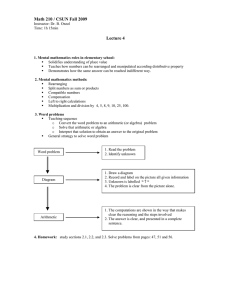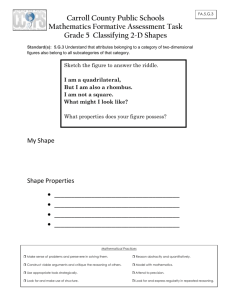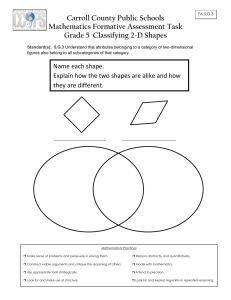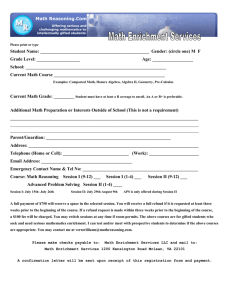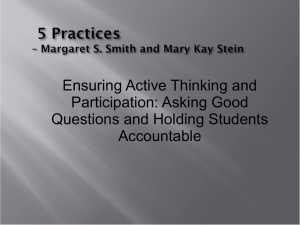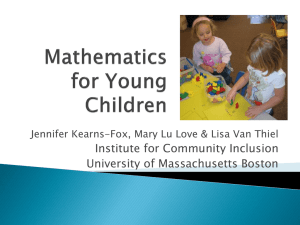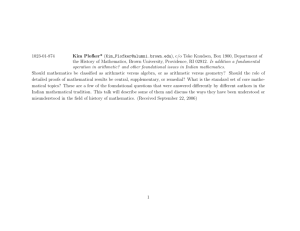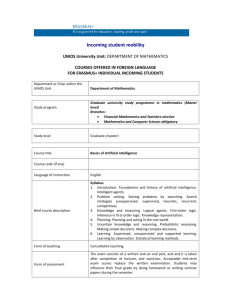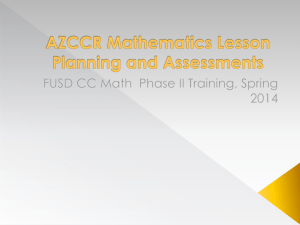How Can I Help My Child?
advertisement
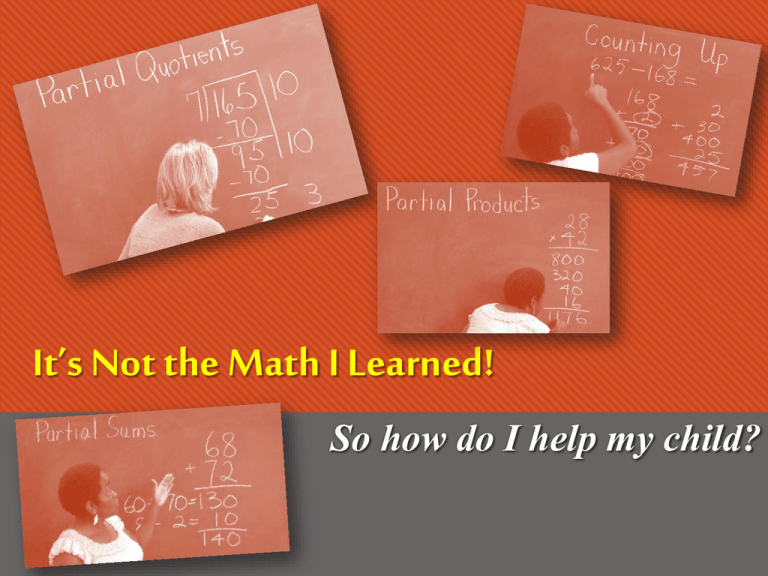
It’s Not the Math I Learned! So how do I help my child? What is Mathematics? Traditional View Negative Attitudes and Perceptions Emphasis Ignored Rules and Procedures Concepts and Big Ideas Computation Problem Solving Answers Thinking Processes One “best” Way Alternative Flexible Strategies Listen, copy, memorize, drill Explain, predict, justify, represent The Cooking Analogy “Arithmetic has usually been taught like it's a recipe: Take the raw ingredients (the numbers), follow a series of steps, and end up with a tasty end result (the answer). While an experienced baker knows why you cream butter and sugar before adding eggs, then add flour last, a beginner just following the steps is in the dark. They might know what to do, but they can't explain why.” (Nelson, 2014) What is the curriculum? Why the changes? Global economic concerns International comparisons College and career readiness 78% of adults cannot explain how to compute interest paid on a loan 71% cannot calculate miles per gallon 58% cannot calculate a 10% tip Mathematics Advisory Panel Final Report, 2008 The Standards for Mathematical Practice Overarching Habits of Mind Make sense of problems and persevere in solving them. Attend to precision. Reasoning and Explaining Reason abstractly and quantitatively. Construct viable arguments and critique the reasoning of others. Modeling and Using Tools Model with mathematics. Use appropriate tools strategically. Seeing Structure and Generalizing Look for and make use of structure. Look for and express regularity in repeated reasoning. What does it mean to be “fluent”? Accuracy Efficiency Flexibility What does it mean to be “fluent”? 9 50 Strategies vs. Standard Algorithms The Rule of Thumb “If you can’t explain why the method works, you shouldn’t be using it.” – John Van de Walle Eastern Algorithm for Multiplication The Bottom Line Number sense is the strongest predictor of success in higher level mathematics (e.g., middle/high/college) Rote memorization, when emphasized over sense-making, tends to inhibit the development of number sense. Instead of simply asking, “What is 7 + 9?” consider asking “How could you use 7 + 7 to help solve 7 + 9?” The Arithmetic to Algebra Gap “Drill alone does not develop mastery of single-digit combinations.” (Kilpatrick, Swafford, and Findell 2001, p. 192) Learning to decompose and recompose numbers in flexible ways is integral to developing efficient computational strategies, number sense, and ultimately, readiness for algebra. (Wheatley & Reynolds, 1999) Representation: Arithmetic 𝟐𝟕𝟑 𝟏𝟑 = 21 Representation: Algebra 𝟐𝒙𝟐+𝟕𝒙+𝟑 = 𝒙+𝟑 𝟐𝒙 + 𝟏 Relational Understanding Skemp (1978) defined an instrumental explanation as simply stating what to do in order to solve a problem. In contrast, a relational explanation is characterized not only by knowing what to do in order to solve a problem, but also explaining why. Benefits Less to remember/recall Compression in the brain occurs when information is connected When you understand concepts, your brain uses LESS working memory Enhanced problem solving abilities (e.g., flexibility) Improved student attitudes/beliefs “Why should my child use drawings?” Conceptual Understanding Multiple Representations “Why should my child use drawings?” A student stands 12 feet ahead of the starting point on a line. He takes 5 equal jumps and lands 27 feet beyond the starting point. How long was each jump? 12 + 5j = 27 How Can I Help My Child? • Be positive • Don’t say “I was never good at math” or “I hate fractions, too!” • Ask questions • • • • • What do you think? How do you know this? (Show me.) Why do you think this? Can you tell me more? What questions can you ask your teacher? How Can I Help My Child? Help them master basic facts • 3 phases of basic fact mastery • If using flash cards, target/focus on a few facts at a time • Shoot for 4-5 sec. for recall How Can I Help My Child? Support math homework Avoid “doing it” Ask your child what is confusing to them – see if they can articulate it (this supports adaptive reasoning and selfregulation). If needed, work out a similar problem as model for your child to reference How Can I Help My Child? Encourage them to try mental math.* Look to a teacher’s itslearning page, the student work book, or ask the teacher if your child does not understand a concept. Help them solve word problems. Ask them to read and then paraphrase/summarize the problem Ask them to circle key information, the question being asked Ask them to VERIFY their solutions – “How do you know it makes sense?” Help them make sense of problems by asking, “Why does this answer NOT make sense?” (ex: 9 – 7 ≠ 16) Make math a part of everyday life. How Can I Help My Child? If your child asks for help with a strategy, do NOT tell them, “That’s not how you do it! I’ll show you the way I learned it, which was much easier!” If your child asks for help with a strategy, do NOT tell them, “That’s not how you do it! I’ll show you the way I learned it, which was much easier!” Example: Resources Resources • Video/audio (searchable by topic/standard) • Interactive & adaptive (searchable by topic/standard) • Virtual tools (for modeling math concepts)
